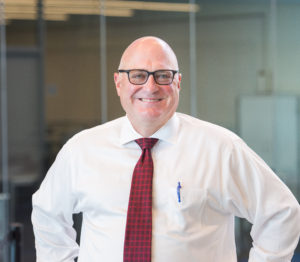Since September, ICE has had a very prominent presence in Waukegan and it has become more pronounced these first weeks of October. In a word, the situation is disturbing.
Who would have thought that in the United States, the greatest country on earth, anonymous agents wearing no recognizable identification and traveling in unmarked vehicles can indiscriminately seize anyone they like with impunity? This is certainly not the America I thought we lived in. Consider these local examples.
Ten days ago, three workers at a business directly across the street from our campus saw two SUVs roll up. Masked, unmarked agents jumped out and took the workers to the ground, zip-tied them, stuffed them into their vehicles, and left. Their wheelbarrow and shovels were left lying on the ground.
Last week, a relative of one of our students was stopped while getting gas on the way to work at the station next to CRSM. They took his entire crew and left his landscaping truck there at the pump.
Also last week, a 23-year-old US citizen was arrested in front of Waukegan City Hall. The Mayor came out to try to help her but ICE agents refuse to listen and took her away. All charges were later dropped and she was eventually released.
Just this week, one of our teachers was working late and got pulled over after dark by an unmarked car after leaving our lot without any probable cause. Two masked, shadowy figures came to either side of her car and demanded identification. When they found that she was white and had a valid license, they let her go. Shaken and intimidated.
Where are the drug dealers, gang bangers, murderers, and rapists that the current administration promised would be their focus? This is nothing but political theater at the expense of peoples’ lives. It is causing real harm to our community.
Studies show that immigrants (both legal and undocumented) commit crime at a far lower rate than U.S. born citizens. A Princeton University study (2012-2018) using felony arrest data for the state of Texas found:
- U.S.-born citizens are over 2 times more likely to be arrested for violent crimes than undocumented immigrants
- For drug crimes, U.S.-born are ~2.5 times more likely to be arrested
- For property crimes, US citizens are over 4 times more likely
A CATO Institute study came to similar conclusions looking at incarceration rates:
- Native-born Americans account for ~1,471 per 100,000 inmates
- Undocumented (“illegal”) immigrants are incarcerated at rate of ~756 per 100,000 (~49% lower than US-born)
- For legal immigrants, only ~364 per 100,000 are incarcerated
Factual data does not support the current storyline and yet, too many people are willing to believe the lies.
What is most disturbing, however, is that for those of us who claim to be Christians, especially Catholic Christians, we have somehow compartmentalized our beliefs and abdicated our responsibility to live the gospel.
“I was hungry and you gave me food, I was thirsty and you gave me drink, I was a stranger and you welcomed me.” (Matthew 25:35)
The words of Jesus are simple, but they reach into the heart of our faith. They remind us that every act of mercy is an encounter with Christ himself. The stranger, the hungry, the imprisoned, and the forgotten are not interruptions in our discipleship—they are the very presence of the Lord who says, “Whatever you did for one of the least of these my brothers and sisters, you did for me.”
The parable of the Good Samaritan (Lk 10:25–37) further reveals that love of neighbor knows no boundaries and that mercy, not status or nationality, defines authentic discipleship.
In one of Pope Francis’ homilies, he acknowledges that it’s not easy to put ourselves in another person’s shoes, especially those very different from us, and this can cause us to have doubts and fears. He goes on to say, “These fears are legitimate, based on doubts that are fully comprehensible from a human point of view. Having doubts and fears is not a sin. The sin is to allow these fears to determine our responses, to limit our choices, to compromise respect and generosity, to feed hostility and rejection. The sin is to refuse to encounter the other, to encounter the different, to encounter the neighbor, when this is in fact a privileged opportunity to encounter the Lord.”
Pope Francis also said, “The brother who knocks at the door deserves love, hospitality, and every care… We are called to welcome, protect, promote, and integrate migrants and refugees… Christ’s love invites conversion—a change in how we see the world and one another. The measure of our discipleship is not comfort but compassion. In welcoming the stranger and lifting up the poor, we open our hearts to God’s own mercy.”
Catholic social teaching deepens this truth: every human person bears the image of God and possesses an inviolable dignity. To honor that dignity is to practice solidarity—to recognize that our lives are bound together. The Catechism of the Catholic Church calls the works of mercy “indispensable expressions of love” (CCC 2447). The Compendium of the Social Doctrine of the Church teaches that “love for others, and especially for the poor, is made concrete by promoting justice.”
Pope Leo XIV recently wrote, “God has a special place in his heart for those who are discriminated against and oppressed, and he asks us, his Church, to make a decisive and radical choice in favor of the weakest.”
The current state of affairs is full of misplaced judgment, irrational hatred, and breathtaking cruelty. If we truly believe in the message of the gospel, then we, too, must find a special place in our hearts to treat others with the inviolable dignity and respect they deserve as fellow human beings – fellow children of God.
At least that’s my prayer. We are better than this. ¡Viva Cristo Rey!

